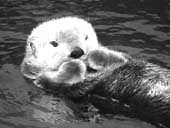 |
   |
| HOME > Wild Life > Oppose sea otters hunt for aquaria |
|
|
|||||||||
ALIVE
All Life In a Viable Environment
5-18-10-102, Honkomagome, Bunkyo-ku, Tokyo, 113-0021
Japan
Tel.+81-3-5978-6272
Fax..+81-3-5978-6273
![]()
Anti Vivisection Action Network
Dear
friends, [DOCID:fr15jn01-78] DEPARTMENT
OF THE INTERIOR Notice of Receipt of Applications for Permit Marine Mammals The
public is invited
to comment on the following
application(s)
for a permit to conduct certain activities with marine
mammals. The
application(s) was submitted to satisfy requirements of the
Marine Mammal
Protection Act of 1972, as amended (16 U.S.C. 1361 et seq.) and the regulations governing marine mammals (50 CFR 18). Written data, comments, or requests for copies of these complete applications or requests for a public hearing on these applications should be sent to: The U.S. Fish and Wildlife Service Division of Management Authority 4401 N. Fairfax Drive, Room 700 Arlington, Virginia 22203 Telephone 703/358-2104 fax 703/358-2281 THESE
REQUESTS MUST BE RECEIVED
WITHIN 30 DAYS OF THE
DATE OF THE PUBLICATION
OF THIS NOTICE. Anyone
requesting a hearing
should give specific
reasons why a hearing
would be appropriate.
The holding of such a
hearing is at the discretion
of the Director.
Applicant: Aquamarine Fukushima, Iwaki, Japan, PRT-020575. Permit Type: Take and Export for public display Name and Number of Animals: Northern sea otter (Enhydra lutris lutris), 1.2 Summary
of Activity to
be Authorized: The applicant requests
a permit to
live capture from the waters of Alaska 3 adult Northern sea
otters and
export them to their facility in Japan for the purpose of
public display.
Source of Marine Mammals: Wild sea otters from Alaska. Period of Activity: Up to 5 years, if issued Applicant: Ibaraki Prefectural Oarai Aquairium, Ibaraki, Japan. PRT-043001 Permit Type: Take and Export for public display Name
and Number of
Animals: Northern sea otter (Enhydra
lutris lutris),
1.4 Summary of Activity to be Authorized: The applicant
requests a permit
to
live capture from the waters of Alaska 5 adult Northern sea
otters and
export them to their facility in Japan for the purpose of
public display
Source of Marine Mammals: Wild sea otters from Alaska Period of Activity: Up to 5 years, if issued Dated: June 1, 2001. Monica Farris, Senior Biologist, Branch of Permits, Office of Management Authority. [FR Doc. 01-15092 Filed 6-14-01; 8:45 am] BILLING CODE 4310-55-P Relevant information] *The sea otter population has declined dramatically On July 5, 2000, ENN News reported that "a recent survey by the U.S. Fish and Wildlife Service revealed that the sea otter population in Alaska's Aleutian Islands has declined 70 percent since 1992 and 95 percent or more throughout much of the archipelago since the 1980s. A survey conducted in the 1980s by the Alaska Department of Fish and Game estimated that there were 55,000 to 100,000 sea otters in the area. This number has declined dramatically to only 6,000 otters, according to the recent survey." ("Aleutian otters take a nosedive") If the applicants are applying for permit because they are not aware of the current situation regarding the sea otter population, it shows their lack of interest in the conservation of endangered wildlife. And if they are aware, it means they do not care if the capturing proccess will put unnecessary stress to the already straining population, not to mention taking more individuals from it. *Inferior standard of care and management of Japanese aquaria does not meet the requirements of the US Animal Welfare Act. Several months prior to the above report, an American animal dealer, who applied for permit to capture sea otters from the Alaskan water for a couple of Japanese aquaria, had withdrawn the application as it was revealed that the Animal and Plant Health Inspection Service (APHIS) was unable to determine that care and management programs comparable to those required under the Animal Welfare Act are in place at either aquarium, and, as a result, the Marine Mammal Commission (MMC) issued a denial recommendation for one of the aquaria and a recommendation for either denial or an on-site inspection for the other. Both aquaria are members of the Japanese Association of Zoological Garden and Aquariums (JAZGA), whose membership is supposed to require a certain standard of care and facilities. *Lack of moral and ethics among JAZGA member facilities In reality, being a member of JAZGA does not mean that a facility has any obligation to provide a certain quality of care to the animals they keep. A few years ago, an African elephant died at Shirahama Adventure World, another member of JAZGA and also has marine mammals including orcas captured at the infamous Taiji, as a reslt of unnatually abusive 'training'. One
of their employees
secretly videotaped the training
sessions till
the day this elephant died. The videotape was broadcasted
on a national
TV
station and it caused a major uproar from the viewers. And Hakkeijima Sea Paradise, also a member of JAZGA,
spent years 'training' walruses to blow alphorns
in a musical band for a show.
This show includes three 'singing' belugas as well. Even
after the revision
of December 1999, Japanese
animal protection
law is ineffectual and once in this country, no animal can expect
legal
protection no matter what happens. Masako
Miyaji
|
| |
